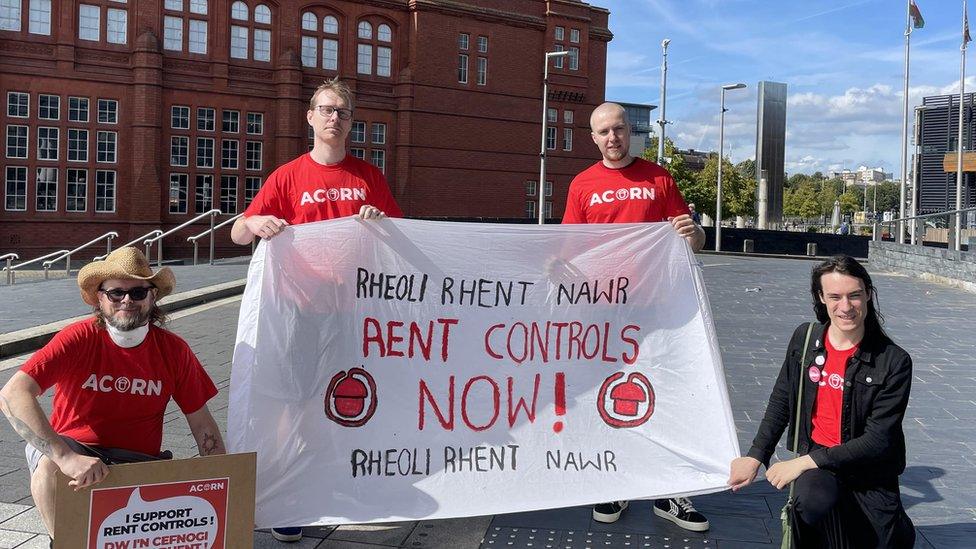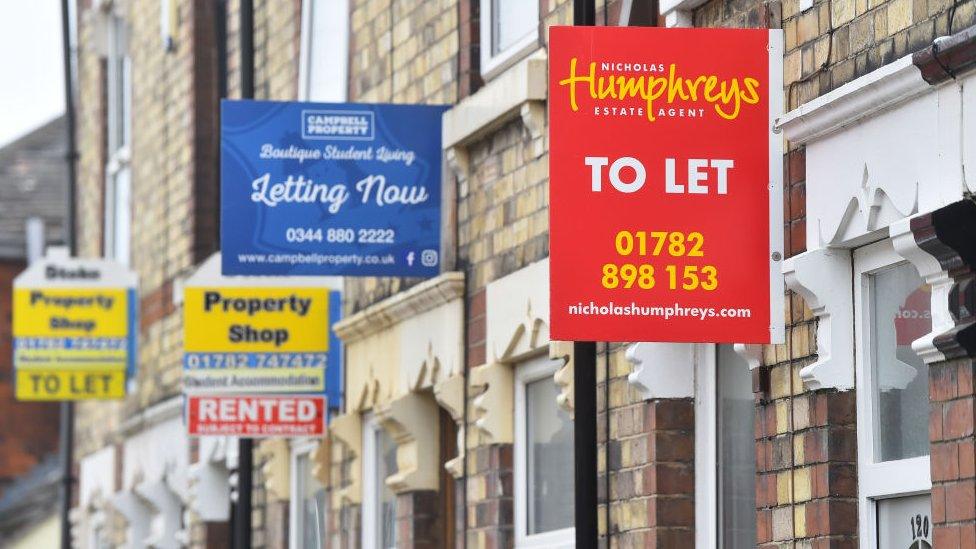Renting: High prices force woman to live in mouldy flat
- Published

Members of Acorn Cardiff are campaigning for rent controls to be brought by the Welsh government
A woman with complex health issues says she was forced to move into a mouldy flat after being "priced out" of the rental market.
Elen Johnston, 22, said some landlords in Cardiff wanted up to 12 months of rent upfront.
New data shows rent in Wales increased by 6.5% in the 12 months to August 2023, external - the highest rise in the UK.
The Welsh government said it was committed to delivering 20,000 more homes for rent in the social sector.
Ms Johnston has postural tachycardia syndrome (PoTS), external as well as autism and mental health issues.
She was regularly travelling to Cardiff from Exeter earlier this year while searching for accommodation for her upcoming masters degree - paying for overnight stays each time.
She and her partner Louis Hardiman said there were dozens of applications for every property and often a flat would be gone by the time they had viewed it.
The couple said they eventually found somewhere by offering a holding deposit before even viewing it.
Ms Johnston said: "Different people were saying you needed to have a different combined salary, and some places were saying [that] to compete with other applicants, we had to be able to pay 12 months upfront.
"I definitely felt priced out. I think it pressurises you to take somewhere that doesn't have the best living standards. It ended up being an expensive mistake."

Elen Johnston and her partner Louis Hardiman had to leave their flat after two months, after taking it while "desperate"
She said the flat she moved into had extensive mould, which had been painted over.
"If I washed my hair, it would smell of mould. We had to somehow dry towels straight after use or they would grow fluffy bits," she said.
It triggered the symptoms of her PoTS and, after two months, the couple were forced to find alternative accommodation.
Despite working in retail on weekends to cover rent, Ms Johnston said she had to borrow money from her parents to get out of the contract and secure more expensive private student accommodation.
"I think people normalise the idea of students living in these kind of conditions because they've chosen to study, but nobody should have to."
While private rent in Wales rose by 6.5% in the latest data, it was 6% in Scotland and 5.4% in England.
In a report the ONS said demand for rental properties remained high despite suggestions more landlords were selling up due to rising interest rates and the knock-on effects on mortgages.

Adam Ward said he was unable to move because rent prices had risen so much
Trainee lawyer Adam Ward, 24, said he was forced to stay put at his two-bedroom flat in Cardiff Bay because a hike in rent prices meant he would be paying more for less.
"We were looking at quite a lot of different areas but viewings were really booking up and it was competitive," he said.
"One of the reasons I was moving, one of the bonuses of moving in with more people, would have been it being slightly cheaper.
"[But] I would be paying similar amounts for something that was not as nice."
He said friends of his had ended up entering "bidding wars" to rooms in properties.
Daniel Edwards, board member for Wales at Acorn tenants' campaign group, said while some rent increases could be attributed to landlords passing on increases in mortgage rates, they were rising at "unsustainable levels" long beforehand.
"That's why the government needs to intervene now," he said.
The Welsh government said social housing "remains a key priority as reflected in our commitment to deliver 20,000 additional homes for rent in the social sector this government term".
It said the UK government needed to "unfreeze Local Housing Allowance rates to support low-income tenants in the private rented sector to remain in their homes".
The UK government said: "We recognise people are facing pressures in the private rented sector, which is why we introduced the Renters (Reform) Bill, delivering a fairer deal for both renters and responsible landlords.
"Evidence shows that rent controls in the private sector do not work, as they lead to declining standards, a lack of investment and may encourage illegal subletting.
"We are set to spend over £30bn on housing support this year, on top of significant cost of living help worth around £3,300 per household. We've also maintained our £1bn boost to Local Housing Allowance while Discretionary Housing payments provide a safety net for anyone struggling."

CROSSBOW KILLER: Investigating the case of a Welsh murder stranger than fiction
ACID DREAM: How a Welsh farmhouse sparked a revolution of the mind

Related topics
- Published4 May 2023

- Published18 September 2023
